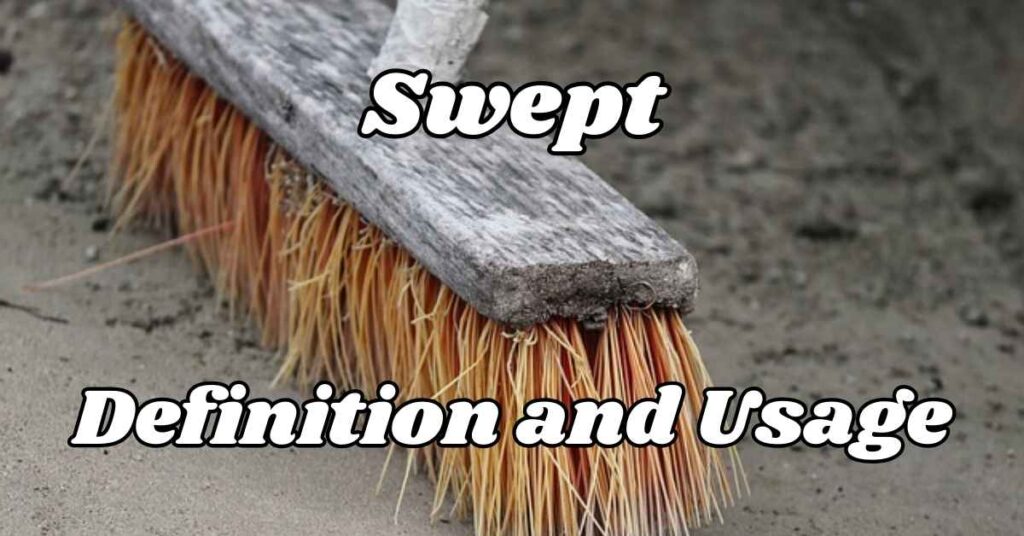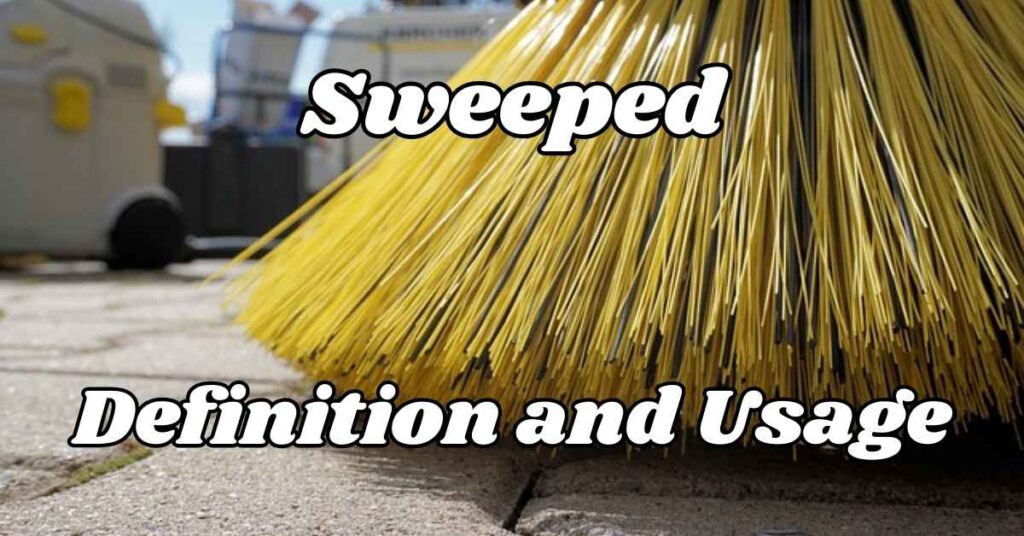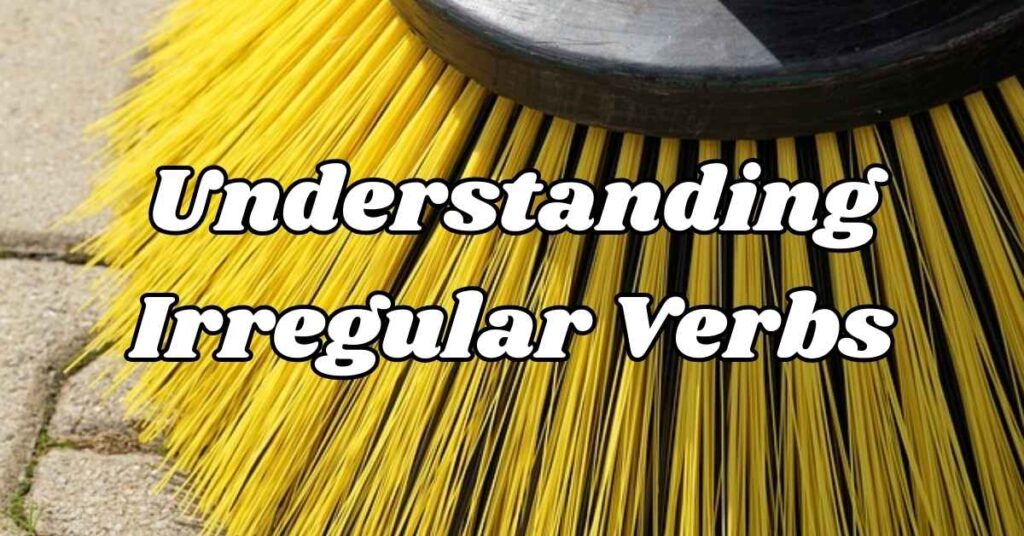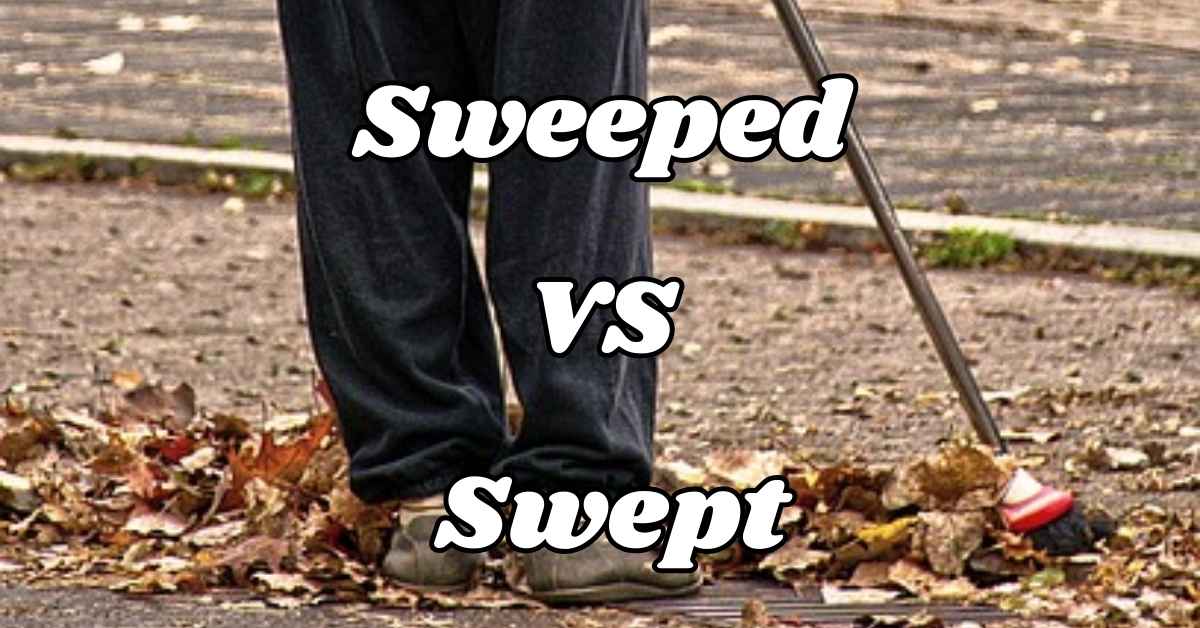Sweeped vs Swept: Many English speakers struggle with this verb tense question. The definitive answer is swept; it’s the correct past tense of “sweep.” This article clarifies why swept is standard and sweeped isn’t, exploring the rules of irregular verbs and conjugation.
We’ll provide helpful sentence examples and explain the source of this common confusion. Understanding the difference between regular and irregular verbs is vital for grammatical accuracy and clear communication.
We’ll also briefly touch upon related linguistic concepts like Tokenization, Lemmatization, and Named Entity Recognition (NER). Mastering verb tenses is essential for error-free writing and English fluency. This guide will help you confidently use “swept” in your writing and speaking.
Quick Summary
The core issue is simple: “swept” is the correct past tense of the verb “sweep.” “Sweeped” is not a recognized English word. This common mistake likely stems from confusion with regular verbs, which form their past tense by adding “-ed.”
However, “sweep” is an irregular verb with a unique past tense form. Remembering this distinction is key to avoiding this frequent error. This article will explore this in detail, providing examples and clarifying the correct usage.
Understanding Sweeped vs Swept
The confusion surrounding “sweeped or swept” arises from the complexities of English verb conjugation. Many verbs follow a regular pattern, but irregular verbs like “sweep” deviate from this norm. This irregularity often leads to errors, especially for learners.
Understanding the difference between these verb types is essential for mastering English grammar. We will examine the correct conjugation of “sweep” and explain why “sweeped” is considered nonstandard.
Why “Swept” is Correct?
“Swept” is the established and universally accepted past tense form of “sweep.” It’s an irregular verb form, just like “went” is the past tense of “go.” This is a fundamental verb conjugation rule in English grammar.
Using “swept” ensures proper grammar and linguistic accuracy in your English writing. Remember, consistency with verb conjugation is key to error-free writing.
Why “Sweeped” is Incorrect?
“Sweeped” is simply not an English word. It’s a nonstandard form that likely arises from a misunderstanding of conjugation patterns. Using “sweeped” will be flagged as an incorrect verb form by any grammar check tool.
Avoiding this common mistake will improve your writing skills and communication clarity. Tools that use Part-of-Speech (POS) tagging and Dependency Parsing can quickly identify such errors.
Conjugations of Sweep: A Complete Guide
| Tense | Form |
| Present | Sweep |
| Present (3rd) | Sweeps |
| Past | Swept |
| Future | Will sweep |
| Present Participle | Sweeping |
| Past Participle | Swept |
Origins of the Swept
The word “sweep” originated in Old English as “swapan,” meaning “to clean with a broom.” It evolved from earlier forms like “swope.” By the late 14th century, “sweep” also meant “to rush or move swiftly.”
Over time, its meaning expanded to include “clearing away,” “dragging something over a surface,” and even “achieving widespread popularity.” The past tense, “swept,” reflects this rich history.
Swept: Definition and Usage

“Swept” means to have cleaned or cleared something with a broom or brush. It can also mean to have carried away by force, as in “The wind swept the leaves away.” Furthermore, it can describe a decisive victory, like “The team swept the series.”
Semantic Analysis helps us understand these different Swept Meanings within their respective contexts.
Swept Meanings
“Swept” carries several meanings beyond the literal act of cleaning. It can describe being carried away by force, as in “The flood swept away the bridge.” It also signifies a resounding victory, like “The team swept the series.”
Furthermore, it can imply a broad, encompassing action, such as “The new policy swept across the nation.” Context is key to discerning the intended meaning of “swept.”
How do we pronounce swept?
The pronunciation of “swept” is a simple, single syllable: /swɛpt/. The “sw” sound is followed by a short “e” as in “bed,” and then the “pt” sound, similar to “kept.”
It’s crucial to pronounce the “t” at the end clearly to distinguish it from other words. Practice saying it aloud to ensure accurate pronunciation.
Usage of Swept in a Sentence: Practical Examples
- She swept the floor meticulously.
- The waves swept over the shore.
- The team swept their opponents in the final round.
- He swept the crumbs off the table.
- A gust of wind swept her hat away.
- The detective swept the room for clues.
- The artist’s brush swept across the canvas.
- The dancer swept gracefully across the stage.
- The illness swept through the community.
- The news swept the nation.
Synonyms of Swept: Expanding Your Vocabulary
- Cleaned
- Cleared
- Carried
- Whisked
- Brushed
- Removed
- Erased
- Wiped
- Scoured
- Purged
Sweeped : Definition and Usage

“Sweeped” is not a recognized English word. It is considered a nonstandard form and should be avoided in both writing and speech. This is a common error stemming from the misunderstanding of irregular verbs.
The correct past tense of “sweep” is “swept,” not “sweeped.” Using “sweeped” can detract from the clarity and professionalism of your writing.
Sweeped Meanings
Since “sweeped” is not a standard English word, it has no established meaning. Any attempts to assign meaning to “sweeped” are based on incorrect grammar.
It’s crucial to use the correct form, “swept,” to convey the intended meaning accurately. Relying on nonstandard forms can lead to confusion and misinterpretation.
Side by Side Comparison
| Feature | Swept | Sweeped |
| Correctness | Standard English word, past tense of sweep | Nonstandard, incorrect form |
| Usage | Used in all contexts (formal/informal) | Not used in standard English |
| Grammar | Irregular verb form | Does not follow any standard pattern |
| Example | “She swept the floor.” | “She sweeped the floor.” (Incorrect) |
Everyday Usage Examples

In everyday conversations, you might hear or say: “I swept the kitchen this morning.” Or, “The storm swept through the town.” Another common usage is, “Our team swept the competition.”
These examples demonstrate how “swept” is naturally integrated into daily communication. Consistent correct usage is essential for clear and effective communication.
Example of Swept in a Context: Detailed Scenarios
- After the party, she diligently swept the entire house.
- The powerful current swept the debris out to sea.
- The basketball team swept their rivals in a three-game series.
- He carefully swept the broken glass into the dustpan.
- A wave of sadness swept over her as she remembered the past.
Example of Sweeped in a Context
- “Yesterday, I sweeped the living room.” (Incorrect)
- “The strong winds sweeped the dunes.” (Incorrect)
- “He sweeped all the dirt under the rug.” (Incorrect)
- “She sweeped the porch after the rain.” (Incorrect)
- “They sweeped the stadium after the concert.” (Incorrect)
Understanding Irregular Verbs

Irregular verbs are verbs whose past tense forms do not follow the typical “-ed” ending used for regular verbs. They have unique past tense forms that must be memorized. “Sweep” is a prime example of an irregular verb; its past tense is “swept,” not “sweeped.” Recognizing and remembering these irregular forms is a key aspect of mastering English grammar.
Tips to Remember
- Memorize common irregular verbs.
- Use a grammar check tool.
- Practice writing sentences with “swept.”
- Read widely to see “swept” used correctly in context.
- Create flashcards for irregular verbs.
Verb Forms “sweeped” and “swept”
“Swept” is the correct past tense and past participle form of the verb “sweep.” “Sweeped” is a nonstandard form and should not be used. It’s crucial to distinguish between these two forms to maintain grammatical accuracy in your writing.
Regular vs Irregular Verb of Sweeped and Sweep
“Sweep” is an irregular verb, meaning it does not follow the typical pattern of adding “-ed” to form the past tense. This is why “sweeped” is incorrect. The correct past tense form, “swept,” must be memorized, as with other irregular verbs.
Consistency with Verb Conjugation of “sweep or swept“
Maintaining consistency in verb conjugation is crucial for clear communication. Always use “swept” as the past tense of “sweep.” Avoid mixing “sweeped” with “swept” as this can create confusion and detract from the overall quality of your writing.
More Article: Arised or Arose: What’s the Difference?
FAQS: Sweeped vs Swept
Is it Sweeped or Swept?
It’s always swept. “Sweeped” is not a standard English word.
What is meant by swept?
“Swept” is the past tense of “sweep,” meaning to have cleaned or cleared with a broom, or to have carried away by force. It can also describe a decisive victory.
What is the difference between swept and sweeped?
The difference is that “swept” is the correct past tense of “sweep,” while “sweeped” is an incorrect and nonstandard form.
Is sweeped grammatically correct?
No, “sweeped” is not grammatically correct. The correct past tense of “sweep” is “swept.”
What does side sweeped mean?
“Side sweeped” is generally not considered correct English. If you mean to describe hair styled to one side, you might say “side-swept bangs” or simply “hair swept to the side.”
Conclusion
In the debate of sweeped vs swept, the answer is definitively swept. “Sweeped” is not a standard English word. Understanding the difference between regular and irregular verbs is key to mastering correct verb tenses.
Remember, “swept” is the past tense of “sweep,” and using it consistently ensures clarity and grammatical accuracy in your writing. By avoiding the common mistake of “sweeped,” you enhance your communication and demonstrate a strong command of English. So, confidently use “swept” and leave “sweeped” behind.
Related Post: Oversight vs Oversite: What’s the Difference?

